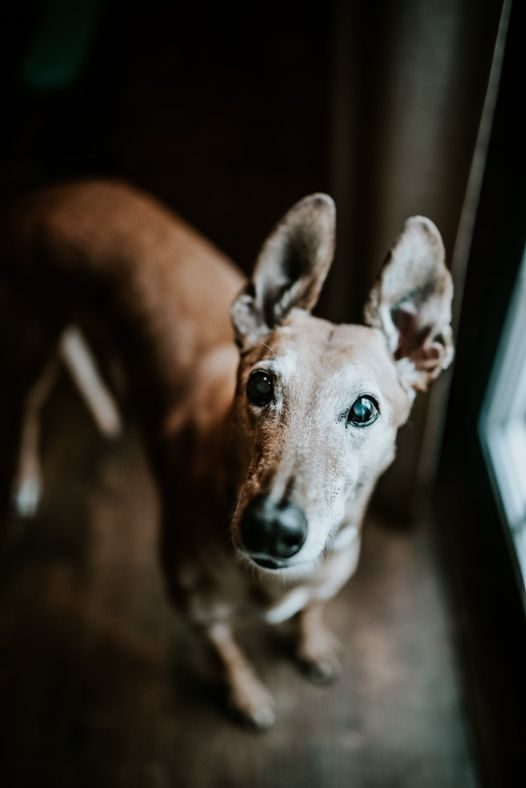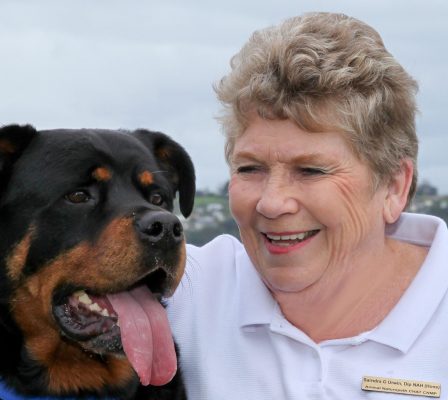The regular but judicious use of homeopathy has a lot to offer for the aged animal and herbal medicine of course really comes into its own in the treatment of age-related conditions. It has been said that homeopathy treats the mind, herbal medicine treats the body; there is definitely an overlap but a very basic guideline at its best.
A healthy dog, regardless of age, is happy, alert, inquisitive and clear-eyed. He loves to play, even, in advancing years, if this is only just exercising the mind!
His coat is shiny, his hair thick and evenly distributed over his body.
His appetite is good, gobbling it up with relish and perhaps taking a drink after this, enough to fulfil his needs.
His stools are well-formed with little or no food appearing unless it has been something indigestible (carrots, sweet corn). Both his urine and stools are passed without straining.
All body orifices are clean and relatively odour-free.
The ageing dog does, however, have some problems that need to be taken into consideration. There is often a decrease or reduction in the supply of blood to all body parts, and the expelling of built-up toxins may be slower than normal.
Arnica – this homeopathic remedy is very useful if the old animal who now and then falls over from a circulatory problem.
Baryta carb is particularly suitable for dogs that go grey early e.g. boxers, rotties. With this remedy there may be a heart involvement, glandular problems, fatty tumours (lipomas), tends to sluggishness and becoming irritated over little things.
The old dog with heart problems benefits enormously from homeopathic and herbal Crataegus, (Hawthorn)
Conium, the homeopathic version of poison hemlock, belongs to the aged dog with weak hind quarters (esp. the German Shepherd). Hip Dysplasia is assisted with the homeopathic remedy Colocynth.
Hair loss in dogs and cats may require homeopathic Thallium. Restlessness at night can be the bane of many an owner of the aged pet and the use of homeopathic Arsenicum or Coffea can address this issue.
Herbal medicine comes into its own with the great nutritional preparations of oat straw, nettle and alfalfa added as infusions to the meals.
Steps to take BEFORE the ageing process appears
Remember that health is a state of mental, physical, emotional and spiritual well being, not just the absence of disease.
Diet is always a good place to start and around the cat and dog’s seventh year, begin reducing his meat intake. Replace with ‘live’ protein sources such as yoghurt, nuts, white cheese or cottage cheese, quark, eggs.
Behaviour to watch out for:
Confusion – forgetting which is outside or inside, getting stuck in corners or just standing staring at walls, lack of concern or disinterest in surroundings.
Returning to the food bowl for ‘another’ meal just after their last one; sudden peculiar changes in food preferences, or the eating of indigestible or unmentionable things.
Losing balance, falling. (Note which side they fall to – important when taking a case.)
A change in interaction with family; absence of displays of affection or recognition; aggression or moody swings, resentment of touch or familiarity by previously sought-after members of the family.
Forgetting their commands or routines.
Pacing at night, restlessness, wandering around the house, sleeping excessively during the day,.
Vocalising (barking or meowing) for no apparent reason,
Inappropriate toileting habits or/and total shamelessness about these habits whereas before they would be private.
Forgetting personal hygiene, (leaving toileting uncovered in the litter tray, not cleaning up their face or genitals esp. after meals/toileting; forgetting to groom.
If your elderly dog or cat shows any of these signs have them health-checked first; diabetes, urinary tract infections and some endocrine disorders can give rise to similar symptom pictures. Don’t forget that most of these problems can still be treated using herbs, homeopathy and a good diet.
.

